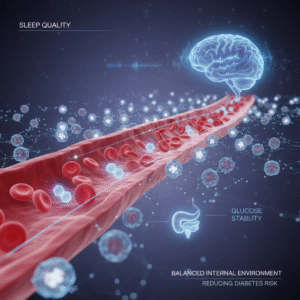Sleep deprivation and brain health are deeply intertwined, with growing research showing just how profoundly lack of quality sleep can damage the brain. A compelling new study published in Neurology reveals a concerning connection: inadequate sleep may contribute to brain shrinkage, especially in regions responsible for memory, planning, and problem-solving.
Researchers tracked 147 middle-aged adults over a 3.5-year period, examining sleep patterns and conducting detailed brain scans. The results were striking—around 35% of participants with poor sleep showed significant loss of brain volume in the frontal cortex, a region vital for executive functions.
This effect was even more pronounced in adults over 60, suggesting that sleep deprivation may accelerate age-related cognitive decline. Though the exact cause-and-effect relationship remains under investigation, improving sleep quality may be a critical step in protecting long-term brain health.
The Impact of Sleep on Brain Health
Quality sleep is essential for memory consolidation, emotional regulation, and brain restoration. During deep sleep stages, the brain clears metabolic waste, repairs neurons, and forms new neural pathways. Without this nightly recovery process, the brain becomes vulnerable to cognitive impairment and even structural changes.
Chronic sleep deprivation can:
Impair neuroplasticity (the brain’s ability to adapt and learn)
Accelerate brain aging
Weaken memory, attention, and problem-solving skills
Contribute to long-term cognitive disorders like dementia
The frontal cortex, responsible for decision-making, self-control, and planning, appears especially vulnerable to prolonged sleep disruption.
Proven Strategies to Improve Sleep Quality
Optimizing sleep isn’t just about getting more hours—it’s about improving sleep efficiency and ensuring deep, restorative rest. Here are five expert-backed strategies that support better sleep and brain health:
🕒 1. Maintain a Consistent Sleep Schedule
Wake up and go to bed at the same time every day, including weekends. Regularity strengthens your internal circadian rhythm and leads to better sleep continuity.
☕ 2. Avoid Late-Night Stimulants
Caffeine, alcohol, and nicotine can interfere with your ability to fall and stay asleep. Limit these substances at least 4–6 hours before bedtime.
🛏️ 3. Create a Sleep-Friendly Environment
Your bedroom should be cool, quiet, and dark. Invest in supportive mattresses and blackout curtains, and minimize ambient noise for a calm, sleep-ready atmosphere.
📵 4. Unplug Before Bed
The blue light from screens suppresses melatonin production, making it harder to fall asleep. Power down phones, tablets, and TVs at least 60 minutes before bedtime.
🌙 5. Practice Calming Nighttime Rituals
Gentle stretching, meditation, journaling, or reading a printed book can help the mind transition into sleep mode. Establish a nightly wind-down routine for best results.
Conclusion
Emerging science makes one thing clear: sleep deprivation negatively impacts brain health, potentially leading to cognitive decline and brain volume loss. By implementing healthy sleep habits, you protect more than your energy levels—you safeguard your brain’s long-term function.
Whether you’re aiming to reduce mental fog or preserve cognitive vitality as you age, making sleep a top health priority is a smart and powerful choice. The sooner you adopt better sleep hygiene, the more resilient your brain will be over time.
Frequently Asked Questions
How does poor sleep affect the brain?
Lack of quality sleep can lead to brain shrinkage, especially in the frontal cortex. This impacts key functions like reasoning, memory, and emotional regulation.
What can I do to improve my sleep quality?
Stick to a consistent sleep schedule
Limit caffeine and alcohol before bed
Create a quiet, dark, and cool sleep environment
Disconnect from digital screens an hour before sleep
Follow a calming bedtime routine like meditation or reading
Sources
- National Sleep Foundation: https://www.sleepfoundation.org
- Mayo Clinic – Sleep Health: https://www.mayoclinic.org
- NIH – Neurological Disorders: https://www.ninds.nih.gov
- CDC – Sleep and Sleep Disorders: https://www.cdc.gov/sleep
- WebMD – Sleep Disorders: https://www.webmd.com/sleep-disorders
- Healthline – Sleep: https://www.healthline.com/health/sleep








